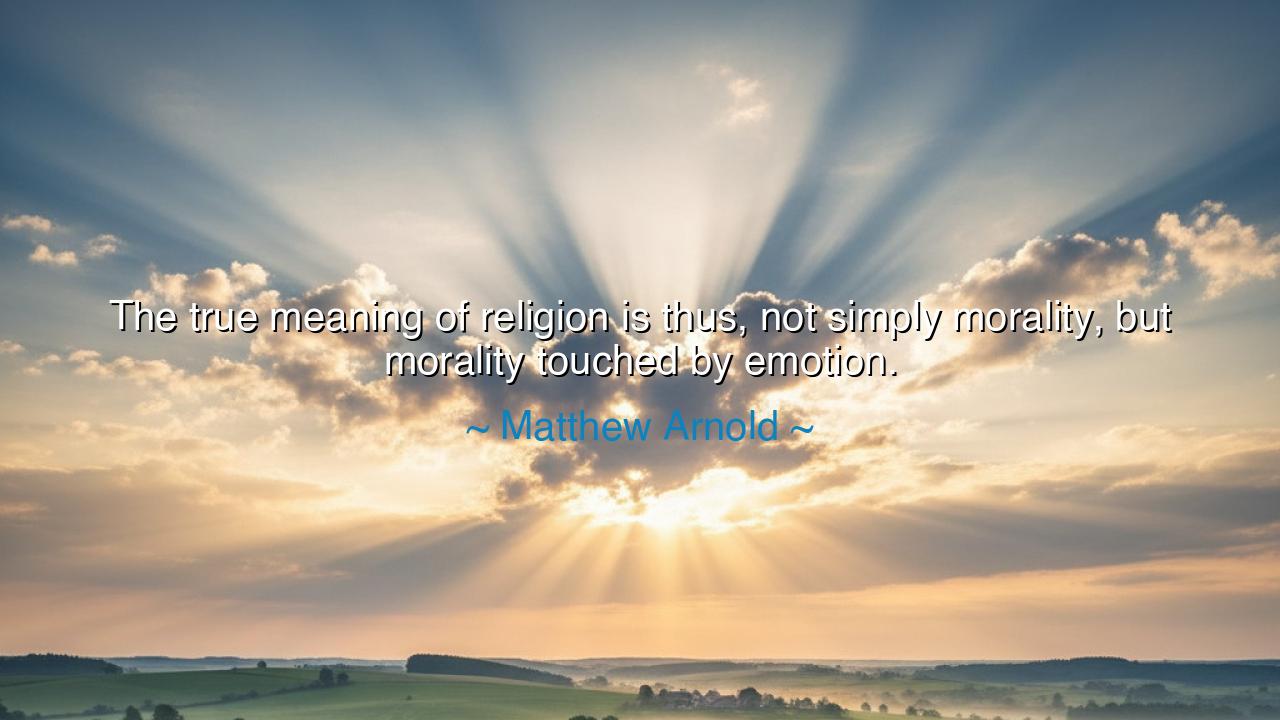
The true meaning of religion is thus, not simply morality, but
The true meaning of religion is thus, not simply morality, but morality touched by emotion.






In the quiet strength of his insight, Matthew Arnold, the poet and philosopher of the nineteenth century, once revealed a truth that shines with enduring clarity: “The true meaning of religion is thus, not simply morality, but morality touched by emotion.” These words, though simple, are like a bell struck in the stillness of the soul. They remind us that morality, when cold and rigid, is only a skeleton of virtue; it gains its living spirit only when touched by emotion, when the heart breathes warmth into the law. Arnold’s wisdom is not the command of doctrine, but the whisper of the eternal — that right action alone is not enough unless it flows from love, compassion, and reverence for the divine spark in all beings.
To live by mere morality is to walk through life with measured steps, obeying the rules of conduct without feeling their sacred pulse. Such morality may restrain harm, but it cannot give birth to goodness. It is emotion — the trembling joy, the tenderness, the awe before life’s mystery — that transforms duty into devotion. When morality becomes infused with emotion, it ceases to be a burden and becomes a song. It is no longer “I must,” but “I love to.” And in that transformation lies the heart of religion, not as dogma or creed, but as living holiness that sanctifies the common moments of existence.
Consider the life of Florence Nightingale, the Lady with the Lamp. Her morality could have been satisfied with obedience to duty — she could have remained within the comfort of her home, fulfilling the expectations of society. But her emotion, her deep compassion for suffering souls, turned duty into sacred service. She walked among the wounded and dying in the dim corridors of war, guided not by law, but by love. In her, we see Arnold’s truth embodied — morality touched by emotion becomes divine action, and service becomes worship.
The ancients too understood this union of law and love. In the Bhagavad Gita, Lord Krishna tells Arjuna that to act righteously without love is emptiness, but to act with love is divine. Likewise, Jesus of Nazareth spoke not only of commandments, but of compassion, declaring that the greatest law is to love. Both taught that the path to heaven is not paved with cold obedience, but with warm-hearted service and mercy. The heart must guide the hand; otherwise, even the most moral act becomes hollow, a shell without a soul.
Arnold’s quote arose in a time when faith was waning and reason reigned supreme. He saw that society, while clinging to ethical codes, was losing its spiritual warmth — that men were becoming moral by law but barren by spirit. His call was a plea for reawakening, for the rekindling of that sacred emotion which makes morality radiant. For without emotion, morality becomes a mechanism; with emotion, it becomes humanity inspired by divinity.
Yet emotion without morality is chaos — passion without purpose. True religion lies in the balance: reason guided by love, ethics lifted by empathy, action crowned with compassion. When morality and emotion walk together, the soul moves in harmony with creation itself. Then every act — feeding the hungry, comforting the sorrowful, forgiving the enemy — becomes not just good, but holy.
So, my children, remember this: be moral, but let your morality breathe. Do not obey only out of fear or habit, but out of love. When you are kind, let it not be from duty alone, but from joy in the giving. When you are honest, let your truth spring from reverence for life, not pride in your virtue. Cultivate a heart as tender as it is disciplined, and a mind as disciplined as it is tender.
For this is the lesson of Matthew Arnold’s wisdom — that the truest religion is not found in temples or texts, but in the union of clear conscience and warm heart. Let your morality be touched by emotion, and your emotion guided by morality. Then your life will become a living prayer, and your every act — no matter how small — will be a reflection of the divine within you.






AAdministratorAdministrator
Welcome, honored guests. Please leave a comment, we will respond soon